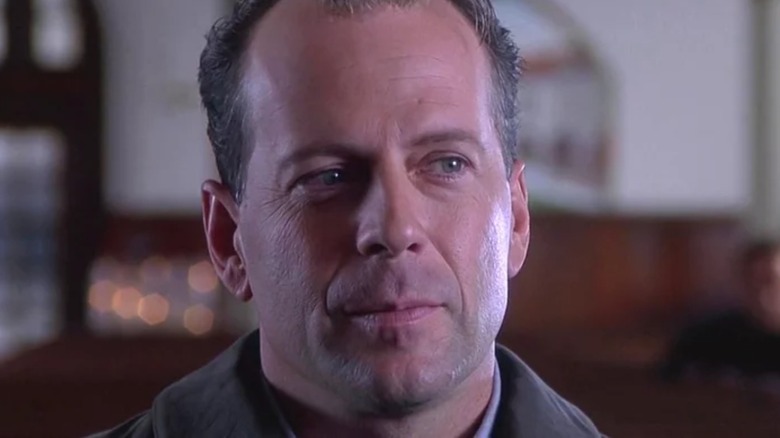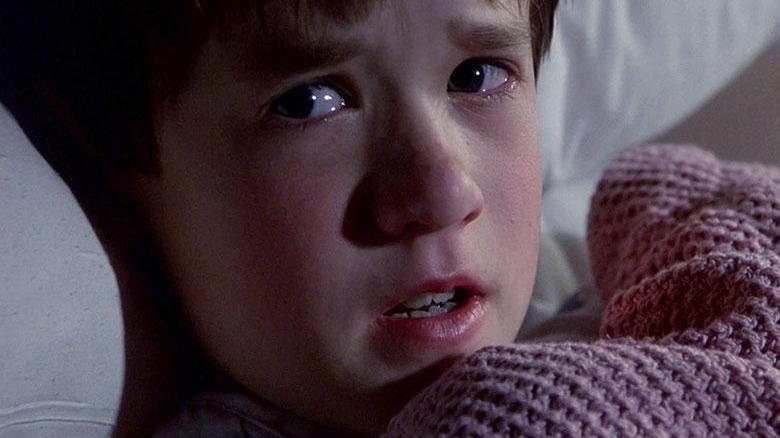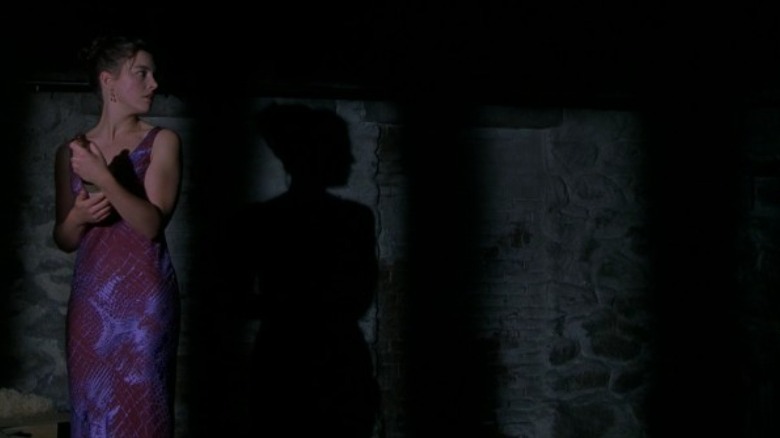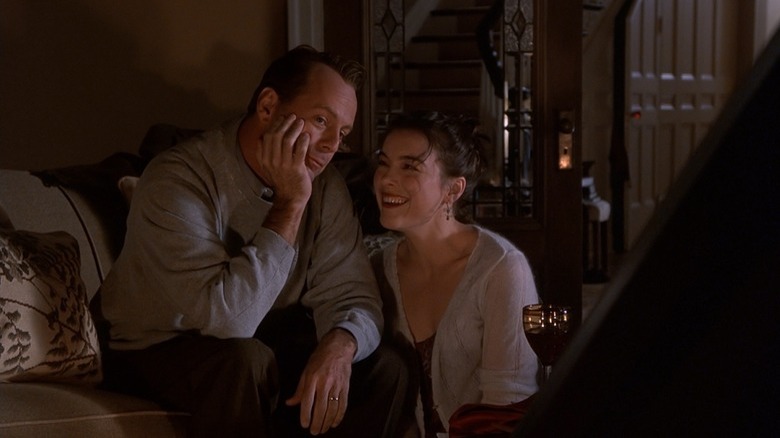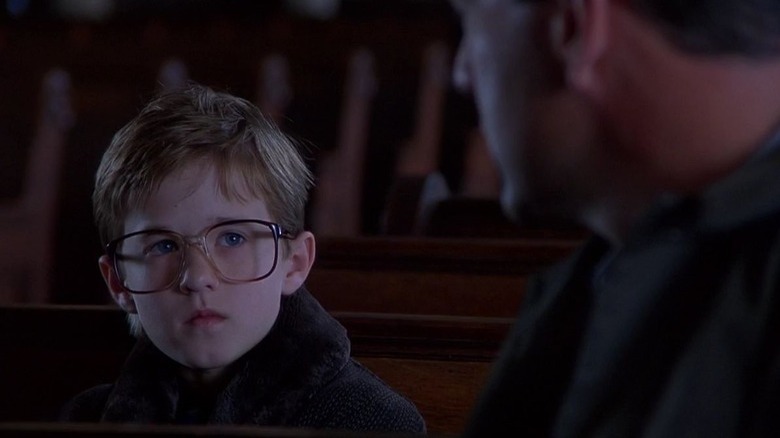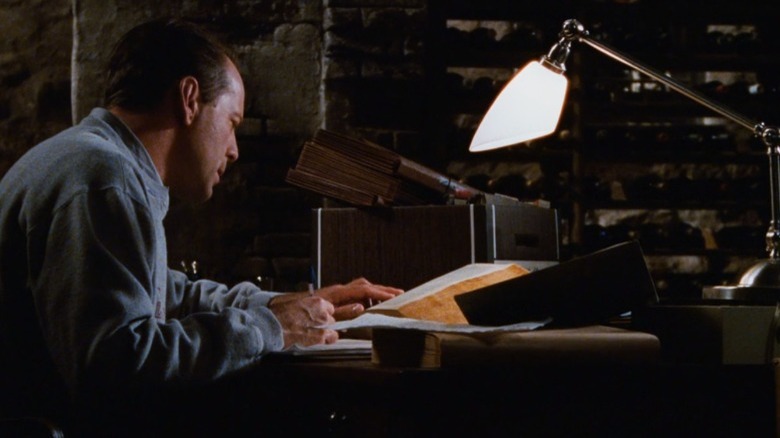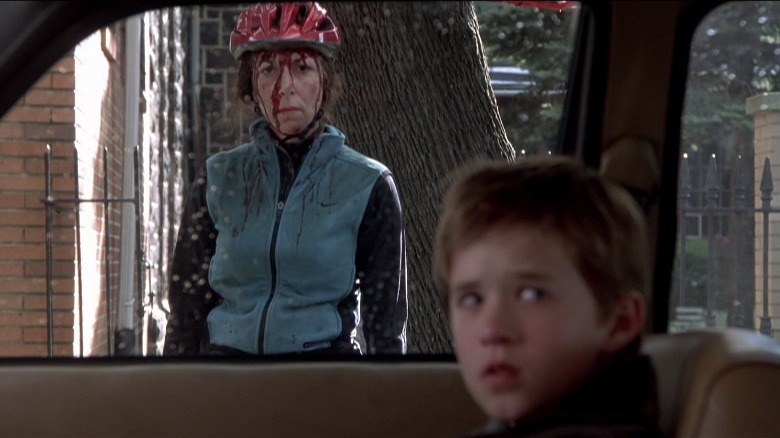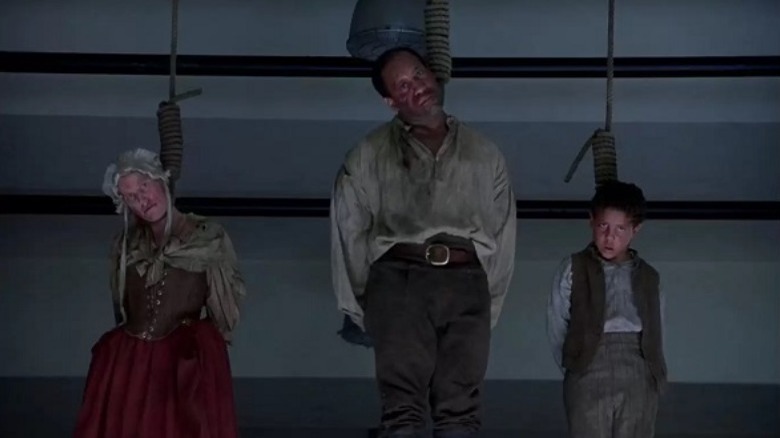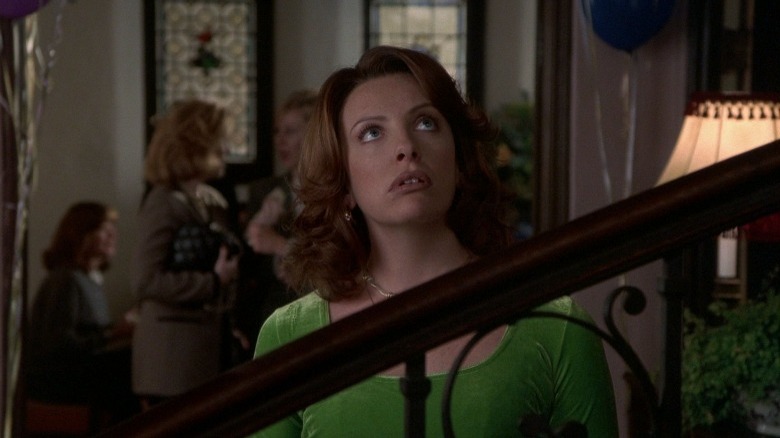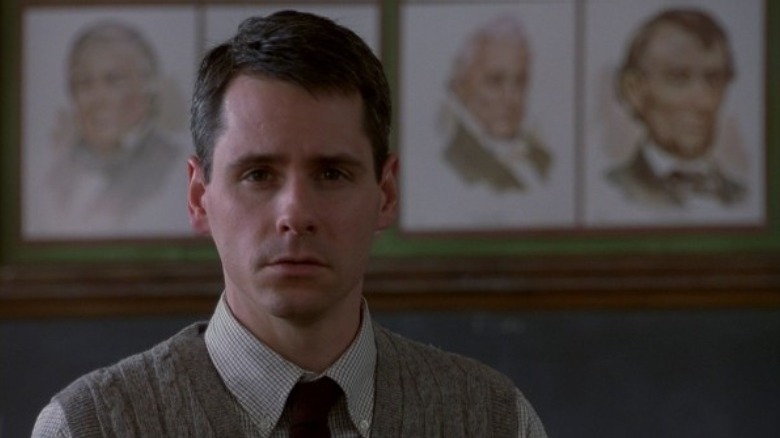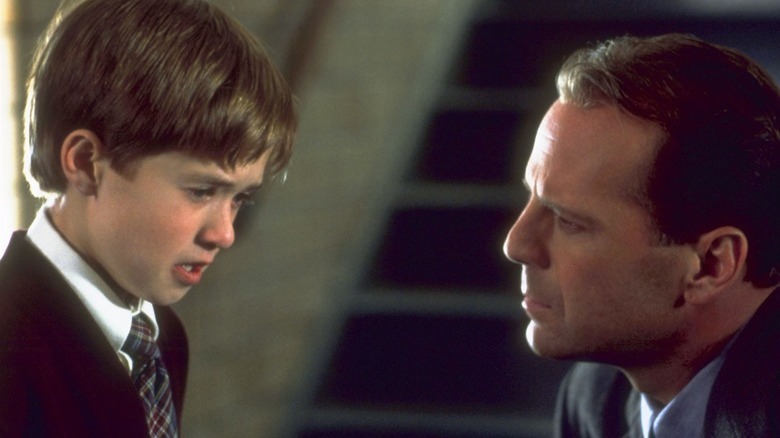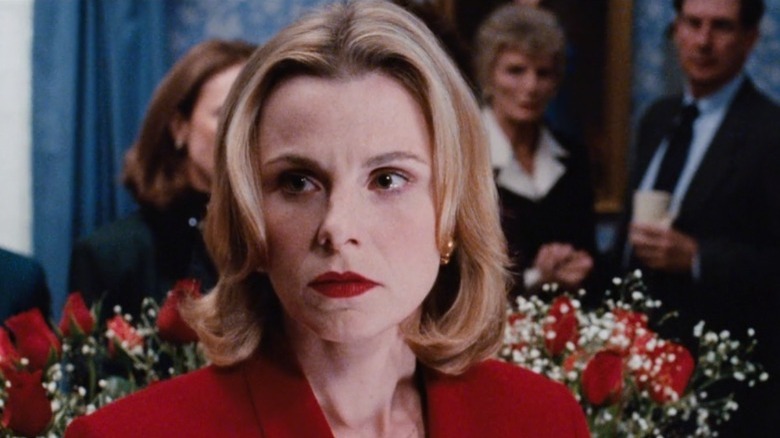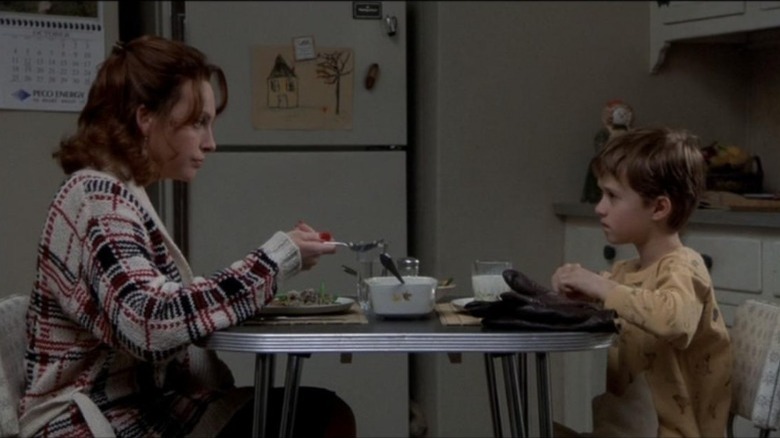Biggest Unanswered Questions From The Sixth Sense
"The Sixth Sense" has what is undeniably one of the greatest movie plot twists of all time. Its shocking ending is so good, it catapulted writer-director M. Night Shyamalan to a career of successively less-renowned swings and misses. But there's something we overlook when we boil the movie down to its infamous twist and the unique place in movie history it holds: "The Sixth Sense" is not quite a horror movie, and not quite a thriller. Harkening back to the genre-defying movies of Alfred Hitchcock, "The Sixth Sense" is a truly original movie that pleased audiences and critics in turn — something that's become more and more rare in a 21st century defined by extended universes and multiple sequels. It's not just for hardcore genre fans, nor arthouse aficionados, nor hardened cinephiles. It's for everyone.
This is impressive, but it also means "The Sixth Sense" covers a lot of ground. Despite being a mostly-flawless puzzle-box of a movie, it plays a little fast and loose with its own rules involving ghosts, among other details. Revisiting the film with an analytical eye reveals the ways in which it jumps, contorts, and otherwise bends over backwards to ensure viewers don't see the ending coming — and some moves land a little more naturally than others. With due deference to an undeniable classic, we're here to play devil's advocate (or at least angry ghost's advocate — Shyamalan wouldn't make a movie about the devil until 2010) and point out the cracks in the story. These are the biggest unanswered questions in "The Sixth Sense."
Does Cole know that Malcolm is dead?
As pretty much everyone knows — spoilers for what is, at this point, a significantly old movie — Dr. Malcolm Crowe (Bruce Willis) is dead the entire time. By far the biggest lingering question in the wake of seeing "The Sixth Sense" is whether or not Cole (Haley Joel Osment) is aware of this fact during his interactions with Malcolm. Based on the way that other ghosts present themselves to Cole — with the injuries that caused their deaths visible and obvious — it seems hard to believe that Malcolm never turned around to reveal his clear and present bullet wound.
Obviously, humanity doesn't quite know what lies beyond this mortal coil, and you could endlessly ask questions about the metaphysics of all the greatest ghost movies. But since "The Sixth Sense" is orchestrated specifically to make our jaws drop when we learn Malcolm has been dead all along, it's definitely fair to question Cole's awareness. It feels more likely than not that Cole is aware Malcolm is a ghost, since his mother obviously never tells him a child psychologist will be coming to see him. Perhaps Malcolm's practiced, calm approach as a psychologist makes Cole more comfortable with him than all of the other, more hostile ghosts?
Is there another ghost in the Crowes' house?
The first scene of "The Sixth Sense" sets the mood for the rest of the movie with a fun bit of foreshadowing. Malcolm's wife Anna (legendary character actress Olivia Williams, whom you might recognize from "The Crown") goes down to the basement to get a bottle of wine and suddenly feels a chill in the air. She glances behind her, gripped by quiet fear. This prompts a question: Is there another ghost in the Crowes' house? This is one of the few scenes to take place before Malcolm gets shot, after all. It's possible that the ghost of someone who lived there years before still lingers.
Basements are famous for being both chilly and generally unsettling, so it's possible this is just a bit of misdirection. But Shyamalan isn't exactly known for his subtlety, and it's apparently cold enough down here for Anna to see her breath. This makes the possibility of a ghost lurking in the basement a lot more likely. Unfortunately, as Cole establishes, ghosts can't see each other. This means Malcolm is unaware that he has company when he spends a fair amount of time down there as a ghost himself, later on in the movie. Alas.
What does Malcolm win an award for?
The opening scene of "The Sixth Sense" finds Malcolm celebrating an award apparently bestowed on him by the mayor of Philadelphia for outstanding achievement in the field of children's psychology. While therapy is a noble pursuit, and, as we come to learn, Malcolm is a caring and attentive psychologist, it's unclear what his outstanding achievement actually is. What has he done, beyond being all right at his job? Did he handle a high-profile case, perhaps involving the mayor's kid or another youngster in his orbit? Did he publish some pivotal research that revolutionized the field? Did he put a name to a long-misunderstood ailment? What did Malcom actually accomplish?
This might seem a bit nitpicky, but it just feels odd to know that in the reality of "The Sixth Sense," the mayor of the sixth-largest city in the U.S. gives a child psychologist a special plaque for a reason we never quite learn. The plaque and associated award ceremony are presented to us as representative of the Crowes' success, right as we get to know them. This makes the award a fairly important plot element. In a movie that requires its viewers to accept ghosts are real, hard-to-believe details tend to stand out.
Is it normal for child psychologists to stalk their clients?
As far as movies go, romantic comedies with messed-up endings tend to be the ones that implicitly endorse stalking. But Malcolm's approach to his job provides a vivid example of this behavior in "The Sixth Sense." Long before we learn that Malcolm is a ghost unwittingly seeking out a child who sees dead people, we're led to believe he's a psychologist who follows his client around, more or less everywhere he goes. After Cole allegedly misses an appointment, Malcolm follows him from his home to a church. He later shows up at Cole's school, waits for him at home, and visits him at the hospital.
The movie's twist explains a lot of this away. But it's unclear what Malcolm's thought process actually is, since he's unaware he's a ghost. He thinks that Cole is a fairly routine patient who's having trouble dealing with being abandoned by his father. Would he normally get so involved with his patients? Has he ever had an office where kids went to see him, as is standard? As beneficial as therapy can be, we can all agree that therapists don't need to show up at clients' school plays and church pews unannounced.
How much can ghosts manipulate objects?
What makes a twist-dependent movie like "The Sixth Sense" so much fun is that the first time you watch it, you get to experience the twist without (ideally) any idea of what's coming. Then, after you've seen and digested the reality-altering revelations, you can re-watch the movie with knowing eyes and catch all the little hints you missed out on in your first go-round. "The Sixth Sense" is especially rewarding in this regard: Scenes with Malcolm and his wife hide the twist with particular deftness. But there's a snag that emerges any time Malcolm picks up or manipulates an object. It's simply not clear how much ghosts can actually affect the physical world.
A lot of ground is covered by Cole's declaration that ghosts only see what they want to see. Consider Malcolm's trouble opening the door to his basement. In the end, we learn that there's a table in front of the door — he's passing through the door anyway and conveniently forgetting it. But then things get confusing. He clearly breaks a window in one scene, but elsewhere, it's unclear if he's really picking up a Latin dictionary or using an old tape recorder. These things might be real, but they might also be the imaginative product of his clueless ghost-malaise. We just can't tell.
How do you help a ghost who doesn't know they're dead?
The brilliance of "The Sixth Sense" lies primarily in two scenes. The ending, with its clear and memorable payoff, is one. But the entire movie hinges far more fundamentally on the famous "I see dead people" scene, in which Cole lays out the rules of ghosts as he understands them. In just a few lines, he establishes the story's logic for us, making the legendary twist ending possible: Ghosts don't know they're dead, can't see each other, and only see what they want to see. All of this checks out when Malcolm has his mind-blowing revelation.
What these rules undercut, however, is the feel-good implication of Cole helping Kyra (Mischa Barton) with her unfinished business. "The Sixth Sense" ends happily, with the idea that Cole might make a habit of helping ghosts out. But how is he supposed to help ghosts who don't know they're dead? The same rules that enable the twist ending mean he'll likely be haunted for life by ghosts who — at least initially — won't come to him with a clear-cut request, like Kyra does. Some ghosts have clearly lingered for centuries, making it unlikely that Cole could ever convince them of their situation. Is it possible to reconcile them to the truth? We can only speculate.
Are ghosts tethered to the place they died?
A lot of horror movies maintain a key rule, when it comes to ghosts: They're confined to the place they died, seemingly for eternity. "The Sixth Sense" plays a little fast and loose with this notion. The ghosts of early Philadelphians who were executed by hanging appear to have lingered at the courthouse that's become Cole's school in the present. But Kyra apparently embarked on a significantly lengthy journey to visit Cole and get his help. This makes the viewer wonder just how many ghosts Cole sees on a daily basis, and what the rules are, regarding how far they can go to seek him out.
Did all of the other ghosts that we see in Cole's apartment live there before he and his mother moved in, or are they there to see him specifically as well? Is the woman who dies on her bike near the end of the movie stuck haunting that spot on the pavement forever, or can she venture forth to haunt whoever takes over her mortgage? Could she conceivably go somewhere she has no connection to at all? Do ghosts ever end up in cemeteries, or is that too much of a cliché in ghost social circles? "The Sixth Sense" answers none of these questions, despite pulling at their threads with Kyra's story.
What happens to Cole in the cabinet?
While "The Sixth Sense" isn't one of the scariest movies of all time, the first half of the movie is a legitimately unsettling work of horror. In retrospect, it's a little surprising it has a PG-13 rating. In classic "Jaws"-like fashion, "The Sixth Sense" creates more fright with what it doesn't show us, rather than what it does. This is especially true in the scene where Cole gets locked in a cabinet during a birthday party. Using nothing more than noises heard through the door, Shyamalan creates a memorably traumatic experience that sets up the following "I see dead people" scene and its associated twist.
But what actually happens in that cabinet? The ghost is clearly calling for help when Cole is walking up the steps. Why does it cause him to have what's described as more-or-less a seizure, once the bullies lock him in with it? After this scene, "The Sixth Sense" essentially switches from being a straightforward horror movie to a less intense drama, in which Cole helps Kyra solve her murder and reconciles with his mother Lynn (Toni Collette). While a more traditional horror movie would keep escalating the scares, it eases off the gas pedal. This is effective, but it also leaves us wondering what precisely went on in its most intense scene.
How does Cole learn about Stuttering Stanley?
In a supremely uncomfortable scene, Cole escalates an argument with his teacher Stanley Cunningham (Bruce Norris) by revealing he knows his childhood nickname, "Stuttering Stanley." But how does Cole learn this? Presumably, this knowledge was revealed to him by a ghost. The most likely candidate is the half-burnt ghost of a teacher who died in the school theater during Stanley's childhood, whom we meet much later. But given that "The Sixth Sense" doesn't depict Cole having a remotely friendly or calm interaction with any ghosts until he meets Malcolm, what was the actual context in which he learned this fact?
Did the ghost of the teacher just yell it out at random? Do she and Cole have a history of making chit chat about his teacher's past? Did the ghost want to give Cole an edge? It's a pretty convenient fact for Cole to know, as it causes his teacher to snap. But it also seems to fly in the face of what we know about Cole's relationship to ghosts before the events of the movie take place.
How have ghosts not been scientifically discovered already?
Let's recap the things that "The Sixth Sense" establishes about ghosts. They can be observed in old photographs as odd flares of light. They consistently cause temperatures so cold they affect thermostats in real time, and cause people's breath to become visible. They can be clearly heard talking in the background of audio recordings made in rooms they occupy. Given all this, it's kind of astounding that ghosts haven't become well-documented, scientifically-proven facts, even if we assume no one prior to Cole and Vincent (Donnie Wahlberg) could see them.
Unlike the scientific consensus of our own reality, the word on ghosts should be out already in the universe "The Sixth Sense" takes place in. There are presumably billions of other photographs containing evidence, and endless hours of white noise in the background of various recordings keen observers should already be aware of. As the story takes place back in 1999, before Google exploded, we might simply assume that the evidence was there for Malcolm to find — he simply didn't think to look. It was a different time, after all: 1999 was more or less the last year a movie could end with a giant twist without the internet spoiling it for everyone. But it's still a little strange that no one has put all the facts together.
What's up with Kyra's mother?
Kyra Collins' murderous mother (Angelica Page) is arguably one of the best movie villains of all time, if you judge by an evil-to-screen-time ratio. In just a couple of scenes, we learn she systematically poisoned her own daughter for a period of months, perhaps years, until the poor girl finally died. Friends and family at the funeral are heard saying that Kyra's younger sister has now taken ill as well, implying that Mrs. Collins is at it again. But why?
The reveal of the videotape is one of the most effective sequences in "The Sixth Sense," aided greatly by Greg Wood's performance as Kyra's devastated father. But the entire subplot doesn't get enough depth, so we're left not knowing what fueled this extreme case of Munchausen syndrome by proxy. Kyra's mother, dressed in a striking red outfit (red being a motif of significance in the whole movie) remains a cold and dark enigma.
What does Cole's future look like?
In the movie's most touching scene, Cole immediately convinces his mother that he can see ghosts. (It's immensely helpful that his grandmother has apparently been visiting him and revealing things that Cole couldn't possibly have known on his own.) But what does his future hold? This cathartic scene is punctuated with yet another terrifying, grim-faced ghost outside his window, after all. It's nice that he's no longer alone with his secret, especially since Malcolm is, you know, dead. But what will his quality of life actually be like?
Based on the number of spirits we've seen walking around Philadelphia, his circumstances seem dire. Even if he's able to help them all, it would leave very little time to have a normal childhood, grow up, and live a fulfilling life. Hopefully Cole can get a less-pushy, more-alive child psychologist who can help him deal, not only with seeing dead people, but his absentee father issues as well. "The Sixth Sense" presents its ending as a happy one, as if all the hard work of living with this problem is lifted by Cole telling his mother the truth. But Cole will be fundamentally scarred by his ability for a long, long time.
